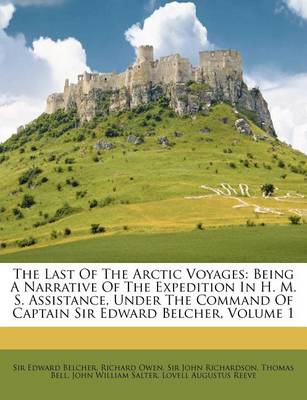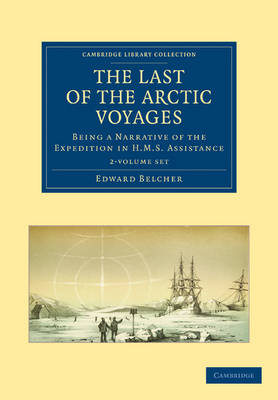Cambridge Library Collection - Polar Exploration
1 primary work • 4 total works
Volume 1
The Last of the Arctic Voyages
by Edward Belcher, Dr Richard Owen, and Sir Edward Belcher
Published 30 June 2011
When the experienced Arctic explorer Sir John Franklin (1786-1847) was put in command of an expedition in 1845 to search for the elusive North-West Passage he had the backing of the Admiralty and was equipped with two specially-adapted ships and a three-year supply of provisions. Franklin was last seen by whalers in Baffin Bay in July 1845. When the expedition failed to return in 1848, enormous resources were mobilised to try to discover its fate. In 1852 H.M.S. 'Assistance' was sent to lead another search mission. It was captained by Edward Belcher (1799-1877), who eventually took the decision to abandon four ships in the pack-ice. He recounts his unsuccessful adventure, defending his actions against critics, in this illustrated two-volume book, first published in 1855, which also includes scientific contributions. Volume 1 describes Belcher's outward journey, Arctic animals such as walruses and whales, and the effects of extreme cold.
When the experienced Arctic explorer Sir John Franklin (1786-1847) was put in command of an expedition in 1845 to search for the elusive North-West Passage he had the backing of the Admiralty and was equipped with two specially-adapted ships and a three-year supply of provisions. Franklin was last seen by whalers in Baffin Bay in July 1845. When the expedition failed to return in 1848, enormous resources were mobilised to try to discover its fate. In 1852 H.M.S. 'Assistance' was sent to lead another search mission. It was captained by Edward Belcher (1799-1877), who eventually took the decision to abandon four ships in the pack-ice. He recounts his unsuccessful adventure, defending his actions against critics, in this illustrated two-volume book, first published in 1855, which also includes scientific contributions. Volume 1 describes Belcher's outward journey, Arctic animals such as walruses and whales, and the effects of extreme cold.
When the experienced Arctic explorer Sir John Franklin (1786-1847) was put in command of an expedition in 1845 to search for the elusive North-West Passage he had the backing of the Admiralty and was equipped with two specially-adapted ships and a three-year supply of provisions. Franklin was last seen by whalers in Baffin Bay in July 1845. When the expedition failed to return in 1848, enormous resources were mobilised to try to discover its fate. In 1852 H.M.S. 'Assistance' was sent to lead another search mission. It was captained by Edward Belcher (1799-1877), who recounts his unsuccessful adventure in this illustrated two-volume book, first published in 1855. Volume 2 covers, and attempts to justify, Belcher's much-criticised decision to abandon four ships in the pack-ice. It also contains Belcher's views on reports of cannibalism among Franklin's crew, as well as scientific observations and a fascinating list of provisions.
When the experienced Arctic explorer Sir John Franklin (1786-1847) was put in command of an expedition in 1845 to search for the elusive North-West Passage he had the backing of the Admiralty and was equipped with two specially-adapted ships and a three-year supply of provisions. Franklin was last seen by whalers in Baffin Bay in July 1845. When the expedition failed to return in 1848, enormous resources were mobilised to try to discover its fate. In 1852 H.M.S. 'Assistance' was sent to lead another search mission. It was captained by Edward Belcher (1799-1877), who recounts his unsuccessful adventure in this illustrated two-volume book, first published in 1855. Volume 1 describes the outward journey, Arctic animals such as walruses and whales, and the effects of extreme cold. Volume 2 covers Belcher's decision to abandon four ships in the pack-ice, and includes scientific observations and a fascinating list of provisions.


